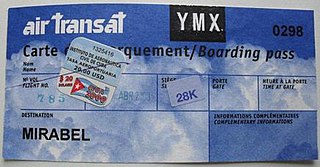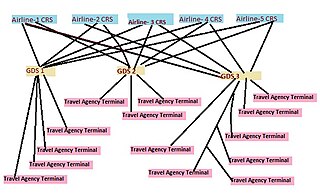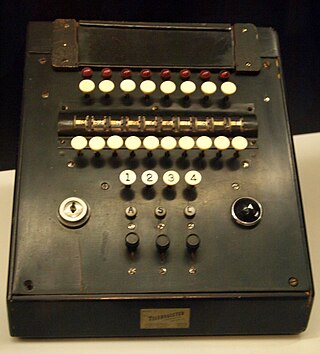
KLM Royal Dutch Airlines, legally Koninklijke Luchtvaart Maatschappij N.V., is the flag carrier of the Netherlands. KLM is headquartered in Amstelveen, with its hub at nearby Amsterdam Airport Schiphol. It is a subsidiary of the Air France–KLM group and a member of the SkyTeam airline alliance. Founded in 1919, KLM is the oldest operating airline in the world, and has 35,488 employees with a fleet of 110 as of 2021. KLM operates scheduled passenger and cargo services to 145 destinations.

Scandinavian Airlines, more commonly known and styled as SAS, is the flag carrier of Denmark, Norway, and Sweden. SAS is an abbreviation of the company's full name, Scandinavian Airlines System or legally Scandinavian Airlines System Denmark-Norway-Sweden. Part of the SAS Group and headquartered at the SAS Frösundavik Office Building in Solna, Sweden, the airline operates 180 aircraft to 90 destinations. The airline's main hub is at Copenhagen-Kastrup Airport, with connections to 109 destinations around the world. Stockholm Arlanda Airport is the second largest hub, with Oslo Airport, Gardermoen being the third major hub of SAS. Minor hubs also exist at Bergen Airport, Flesland, Göteborg Landvetter Airport, Stavanger Airport, and Trondheim Airport. SAS Cargo is an independent, wholly owned subsidiary of Scandinavian Airlines and its main office is at Copenhagen Airport.
KLM Cityhopper is the regional airline subsidiary of KLM, headquartered in Haarlemmermeer, North Holland, Netherlands. It is based at nearby Amsterdam Airport Schiphol. As a subsidiary of Air France–KLM, it is an affiliate of SkyTeam. The airline operates scheduled European feeder services on behalf of KLM.
Computer reservation systems, or central reservation systems (CRS), are computerized systems used to store and retrieve information and conduct transactions related to air travel, hotels, car rental, or other activities. Originally designed and operated by airlines, CRSs were later extended for use by travel agencies, and global distribution systems (GDSs) to book and sell tickets for multiple airlines. Most airlines have outsourced their CRSs to GDS companies, which also enable consumer access through Internet gateways. Modern GDSs typically also allow users to book hotel rooms, rental cars, airline tickets as well as other activities and tours. They also provide access to railway reservations and bus reservations in some markets, although these are not always integrated with the main system. These are also used to relay computerized information for users in the hotel industry, making reservation and ensuring that the hotel is not overbooked.

Business class is a travel class available on many commercial airlines and rail lines, known by brand names which vary, by airline or rail company. In the airline industry, it was originally intended as an intermediate level of service between economy class and first class, but many airlines now offer business class as the highest level of service, having eliminated first class seating. Business class is distinguished from other travel classes by the quality of seating, food, drinks, ground service and other amenities. In commercial aviation, full business class is usually denoted 'J' or 'C' with schedule flexibility, but can be many other letters depending on circumstances.

A boarding pass or boarding card is a document provided by an airline during airport check-in, giving a passenger permission to enter the restricted area of an airport and to board the airplane for a particular flight. At a minimum, it identifies the passenger, the flight number, the date, and scheduled time for departure. A boarding pass may also indicate details of the perks a passenger is entitled to and is thus presented at the entrance of such facilities to show eligibility.

An electronic ticket is a method of ticket entry, processing, and marketing for companies in the airline, railways and other transport and entertainment industries.

Check-in is the process whereby people announce their arrival at an office, hotel, airport, hospital, seaport or event.

In-flight entertainment (IFE) refers to the entertainment available to aircraft passengers during a flight. In 1936, the airship Hindenburg offered passengers a piano, lounge, dining room, smoking room, and bar during the 2+1⁄2-day flight between Europe and America. After World War II, food and drink services were offered, and movies were projected onto big screens viewable by all passengers on long flights. In 1985 the first personal audio player became available for purchase, and noise cancelling headphones were introduced in 1989. During the 1990s, the demand for better IFE was a major factor in the design of aircraft cabins. Before then, entertainment came via audio headphone sockets and airline-provided headphones providing music of various genres and the soundtrack of projected movies. Now, in most aircraft, personal IFE display screens are available at most seats, offering entertainment and flight information such as a moving map, speed, and altitude. The advent of small entertainment and communication devices also allows passengers to also use their own devices, subject to regulations to prevent them interfering with aircraft equipment.

A global distribution system (GDS) is a computerised network system owned or operated by a company that enables transactions between travel industry service providers, mainly airlines, hotels, car rental companies, and travel agencies. The GDS mainly uses real-time inventory from the service providers. Travel agencies traditionally relied on GDS for services, products and rates in order to provide travel-related services to the end consumers. Thus, a GDS can link services, rates and bookings consolidating products and services across all three travel sectors: i.e., airline reservations, hotel reservations, car rentals.
Overselling or overbooking is sale of a volatile good or service in excess of actual supply. Overselling is a common practice in the travel and hospitality sectors, in which it is expected that some people will cancel. The practice occurs as an intentional business strategy in which sellers expect that some buyers will not consume all of the resources they are entitled to, or that some buyers will cancel. The practice of overselling aims to ensure that 100% of available supply will be used, resulting in the maximum return on investment. However, if more customers than the seller expects do wish to purchase or use the sold commodity, it may leave some customers lacking a service they expected to receive.

A ticket is a voucher that indicates that an individual is entitled to admission to an event or establishment such as a theatre, amusement park, stadium, or tourist attraction, or has a right to travel on a vehicle, such as with an airline ticket, bus ticket or train ticket. An individual typically pays for a ticket, but it may be free of charge. A ticket may serve simply as proof of entitlement or reservation. A ticket may be valid for any seat or for a specific one.

Airport check-in is the process whereby an airline approves airplane passengers to board an airplane for a flight. Airlines typically use service counters found at airports for this process, and the check-in is normally handled by an airline itself or a handling agent working on behalf of an airline. Passengers usually hand over any baggage that they do not wish or are not allowed to carry in the aircraft's cabin and receive a boarding pass before they can proceed to board their aircraft.

Geosocial networking is a type of social networking in which geographic services and capabilities such as geocoding and geotagging are used to enable additional social dynamics. User-submitted location data or geolocation techniques can allow social networks to connect and coordinate users with local people or events that match their interests. Geolocation on web-based social network services can be IP-based or use hotspot trilateration. For mobile social networks, texted location information or mobile phone tracking can enable location-based services to enrich social networking.
Social commerce is a subset of electronic commerce that involves social media and online media that supports social interaction, and user contributions to assist online buying and selling of products and services.
Air France, stylised as AIRFRANCE, is the flag carrier of France headquartered in Tremblay-en-France. It is a subsidiary of the Air France–KLM Group and a founding member of the SkyTeam global airline alliance. As of 2013, Air France serves 29 destinations in France and operates worldwide scheduled passenger and cargo services to 201 destinations in 78 countries and also carried 46,803,000 passengers in 2019. The airline's global hub is at Charles de Gaulle Airport with Orly Airport as the primary domestic hub. Air France's corporate headquarters, previously in Montparnasse, Paris, are located at the Roissypôle complex on the grounds of Charles de Gaulle Airport, north of Paris.
Four airlines, British Airways, Qantas, Air New Zealand and Virgin Australia, have attracted criticism for their controversial seating policies which allegedly discriminate against adult male passengers on the basis of their sex. These four companies refused to allow unaccompanied children to be seated next to adult males on their flights, leading to criticism that they regard all men as a danger to children.

Starting in 1946, American Airlines developed a number of automated airline booking systems known as Reservisor. Although somewhat successful, American's unhappiness with the Reservisor systems led them to develop the computerized Sabre system used to this day.
Ticketfly was a ticket distribution service. Ticketfly was started in 2008 in San Francisco, California, and was eventually bought out and merged into Eventbrite in 2018. Andrew Dreskin, who was the CEO of Ticketfly, previously co-founded the company Ticketweb. Ticketfly grossed $500 million in 2013, processing 11.2 million tickets for more than 80,000 events across Canada and the United States.

Basic economy class is a travel class offered by a number of airlines. The class has superseded economy class as the cheapest airfare option for passengers and generally comes with more restrictions when compared to standard economy fares. Restrictions vary between different airlines, but they generally include not allowing passengers to change or cancel tickets or select seats for free. They are seen as a strategy for market segmentation.












